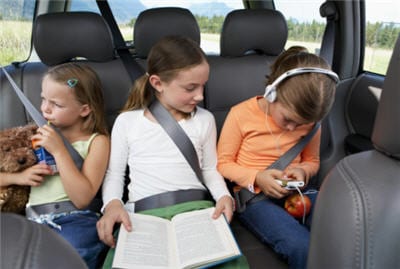Think back to your childhood summer vacations and you may be reminded of your fondest memories traveling with your family. Many children and their families have been waiting a whole year to visit relatives, go on a special trip, or take a relaxing vacation. Traveling with children can be challenging but having strategies can help make summer vacations more enjoyable, particularly if you have a child with special needs. Many families I have worked with have had negative experiences traveling and have ended up cutting their vacations short because of lack of planning. To avoid these potential frustrating summer vacations, here are some tips based on research findings and years of clinical experience with hundreds of families of children with special needs that can help make your summer vacation successful and stress free!
Plan in Advance
Talk to you child in advance about the trip details and plans. You can look on line and show them photographs of the location(s) where you plan to go including the hotel or home where you plan to stay and the activities that will be available. If you will be staying with or traveling with family members or friends, show your child photographs of those you will be visiting so they can be familiar with them. Find similarities between your children and the others who you will travel with. For example, if your son loves Superheros or Star Wars, ask your relatives about their favorite things. By familiarizing your son or daughter with the locations, people, and activities you are increasing the likelihood of them understanding what the travel expectations will be. You will also be setting up potential social situations to help your son interact with the family members. Also, by talking about the trip in advance, you may be able to determine what activities your son or daughter would be most interested in. Then, you can use these as rewards (see rewards below).
Visual Support
Children with special needs, especially Autism Spectrum Disorders, do well when they have visual support to help them understand expectations. To help your son or daughter understand the travel plans, you could create some visual projects that they can look at and bring with them as you prepare for your vacation. Here are two examples that may be fun to create and helpful to reduce the stress.
1. Make a Travel Book
If you like to make projects, you can create a travel book with photos of your vacation plans. Have your child help you create his or her own travel book by selecting the photos or words from the computer images, type in comments, or color the pages. If your son or daughter can choose some of the photos that he/she likes, she may be more excited about going on vacation and may pay more attention to the book when you are looking at it and talking about your upcoming vacation plans.
2. Make A Calendar
To help your son or daughter understand when your family will be going on vacation and returning home, you could create a calendar leading up to the day that you will be traveling and another calendar with each day of travel. For example, July 3 may have a photograph of an airplane or the family car to let your son know the day you will be flying or driving to your destination. July 4 may have a photograph of fireworks and the words “noisy fireworks” so your daughter is prepared in advanced and less likely to throw a tantrum as she typically would when she hears loud noises. July 5 may have a photograph and label of “Aunt Klara and Cousin Emma” so your son knows you plan to spend time at your relatives’ house. Each morning you can talk about the plans for the day and rehearse the expectations. Every evening you can discuss what you did and the plans for the next day.
Bring Some Special Items
Does your child have a favorite toy, stuffed animal or movie? If so, you can bring some of these preferred items with you as transition objects to keep him or her busy while you may be waiting in line at the airport, sitting in the car, or transitioning activities. They also may be helpful for your child as comforting objects. Also, have some rewards for good behavior.
Days of travel
Are you excited about your trip but dreading the long day of travel? Find some items that your child really enjoys to use as rewards as you plan to travel across the country. Small, novel, familiar, and quiet items are often great to bring as surprises on an airplane. Wrap them up as presents and use them as rewards for good behavior. Some children respond best to novel items while others prefer the familiar favorites. I recommend quiet activities as those passengers seated near you would thank you. While your son’s favorite toy may be a whoopee cushion or whistle, try to find toys that will not be too noisy for those seated around you.
While on vacation.
Find out what activities at the destinations are most appealing to your child. For example, if you describe the hotel where you plan to stay and your son notices that they have a red lobby, his favorite color, you can remind him that after he sits quietly in the airplane, you will be on your way to see the big red room at the hotel. Of, if your daughter loves to swim, you can let her know that she will get to swim in the pool if she can interact with her cousins.
Set realistic expectations.
Remember, most children, especially young children, present challenges at times. Family vacations present new experiences and are so different from a typical day at home. You can expect the unexpected! You may have thought a day at the beach would thrill your daughter and allow you time to relax, but when you arrive she tantrums because she doesn’t want to get sand on her bathing suit. These unexpected bumps in the road can cause stress to parents. Just remember – as a parent, you are not alone if your son or daughter tantrums on your vacation. Most likely, every parent seated next to you on the airplane, on the lounge beside you at the pool, or at the table near you in the restaurant have been in a similar situation. Do the best you can to prepare him or her and to prepare yourself. It’s your vacation too, so try to stay positive and enjoy the good moments. Then, plan a little time for you to read your favorite book, plan a night out with your husband or significant other, or relax when you get home!
About the Author
Jennifer Symon, Ph.D. BCBA-D is an Associate Professor in the Division of Special Education and Counseling at California State University, Los Angeles. She is also a Board Certified Behavior Analyst and consultant for early intervention preschool programs. Dr. Symon coordinates the autism programs at CSULA and is the Project Director for a federally funded grant to train general and special education teachers, speech therapists, and related professionals how to support students with Autism Spectrum Disorders. Dr. Symon’s background includes work in homes, schools, and community settings with individuals with mild to severe disabilities and across the age ranges. She publishes her research findings in peer-reviewed journals and in texts and also presents at local and national conferences. Her research interests include parent education, early intervention, teacher and paraprofessional training, and program evaluation for individuals with special needs, particularly those on the autism spectrum.





